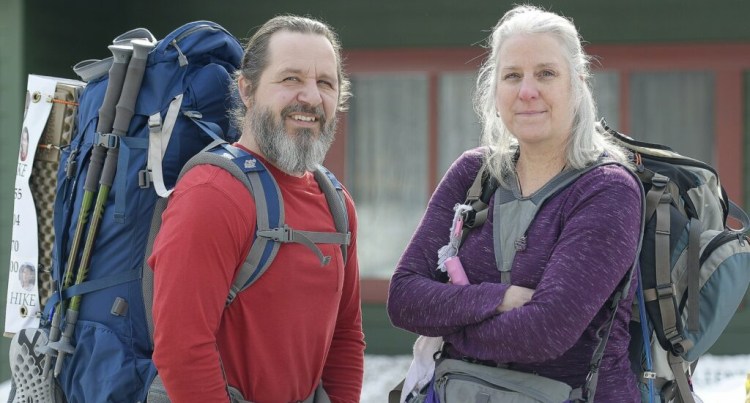BELGRADE — Backpacking on the Appalachian Trail is full of highs and lows. The high of reaching summits with distant, clear views comes with the lows of grueling miles with blisters and fatigue, weather that causes shivering and sweat and soaking rain that can penetrate all equipment and into socks, inducing desperation to find dry shelter. Every day is something new.
Highs and lows that aren’t dissimilar to substance use disorder and recovery.
On April 1, Belgrade couple Karen and Stephen Hardy will start a section hike of the Appalachian Trail southbound from Harpers Ferry, West Virginia, to educate and raise overdose awareness, while honoring victims.
For both Karen and Stephen, overdoses have affected loved ones. In 1993, Karen lost her older brother to an intentional overdose. Stephen also lost a sibling, an older sister in 2001, to an accidental overdose of prescribed medications for mental health.
And now, substance use disorder has almost taken Karen’s son and Stephen’s stepson – Bryan Massey – who has overdosed six times, once nearly fatally.
Karen awoke one 2017 night to find missed calls on her phone, numbers from Florida where Massey had been living.
“And I just knew it was bad,” she said in her Belgrade office Wednesday.
Massey had overdosed – and this time his heart had briefly stopped.
He went into treatment for addiction. Massey had lost two close friends to overdoses, but he would lose more people who touched him during treatment.
“There’s a choice at some point to start and stop,” Karen said.
Massey chose to stop. He has been in recovery for 17 months. He lives in Waterville and is a dean’s list student at Kennebec Valley Community College studying psychology.
“He wants to give back,” Stephen said.
Massey is creative and sensitive – common themes Karen has discovered for people struggling with substance abuse.
“The world is hard, and for folks with overwhelming caring, it’s hard to find their way,” she said.
They hope to convey that not every overdose is fatal – and that it doesn’t only happen to addicts. Each body reacts differently to substances, Karen said.
“It’s hard to hear people who are angry and nasty,” Karen said. “I know it comes from a place of not understanding.”
The idea to section hike the Appalachian Trail came from two inspirations. Before his death, Karen’s brother hiked some of the trail.
“I’ve recently been rereading some of his journals,” she said.
The couple was also inspired by Brett Bramble, who walked from Key West, Florida, to Fort Kent for his sister, whom he lost to an overdose, and to raise awareness of the epidemic. When in Maine, the Hardys provided Bramble support.
“We have a lot of people we’re hiking for,” Stephen said. “We don’t really have a distance in mind. We are just hiking for the allotted time we have.
“Truly, the idea is to talk to people on the trail (and in towns),” he added.
They plan to dedicate days of hiking to overdose victims they learn about on the trail. “Every time we talk about it, someone talks about someone they know or someone they care about,” Karen said. “Almost every time, someone has a story.”
The couple will wear banners on their packs to draw attention to overdoses. Those banners show four years of death totals by overdose nationally. In 2014, that number was 47,055, the banner shows, and in 2017, it was 72,000.
“They’re staggering numbers,” Stephen said. “Nationally, it’s 175 people a day. In Maine, it’s one a day.”
“It doesn’t stop,” Karen said. “It just keeps increasing.
“How do you impress on people how serious it is?” she added. “Numbers sometimes do it, but still we get desensitized by numbers.”
They think positive stories are helpful, and if there were more, Karen said, it might make a difference for the stigma.
When Stephen lost his sister, he said his family didn’t talk about it.
“We knew what the reports said, but as a family, we never talked about it because of the stigma that it was overdose,” Stephen said.
It’s a stigma he and Karen want to change by sharing hope and opening conversations.
Karen is a mental health and substance abuse counselor in private practice in Belgrade. Stephen is a Reiki master and teacher of Reiki, working out of the couples’ Mind, Body, Soul Wellness Center. He is also a handyman. Stephen and Karen each have two children.
In the weeks leading up to their hike, Stephen and Karen are preparing for other wellness activities, so that when they return, they can “hit the ground running.”
Karen, an affiliate of Health Affiliates of Maine, received approval to open an intensive outpatient program for those struggling with substance abuse issues. It’ll be Health Affiliates of Maine’s second IOP. She will start after the hike.
Stephen and Karen are also planning to start a phone support program for families of overdose victims to call. Though in its earliest stages, they see it developing into a Facebook page with links to resources and maybe volunteers on call who can speak with families.
And last fall, the couple purchased 19 acres in Mount Vernon. They hope to use “The Land,” as they’ve nicknamed it, for wellness activities.
There’s an open area appropriate for a community garden near an apple tree, Stephen said. The rest is wooded, “raw land.”
The couple will leave Maine on March 30 to fly to Harpers Ferry, the midpoint of the Appalachian Trail. They’re looking forward to what they can discover about themselves by hiking. Those interested can follow their hike on Facebook.
In trail registers, other hikers can follow Karen by her trail name “Mothership,” a nickname given to her by her son when Massey’s text autocorrected “mother.” Stephen, who is known as “Papa to his young granddaughter,” will hike with the trail name “Papa Smurf.”
Send questions/comments to the editors.



